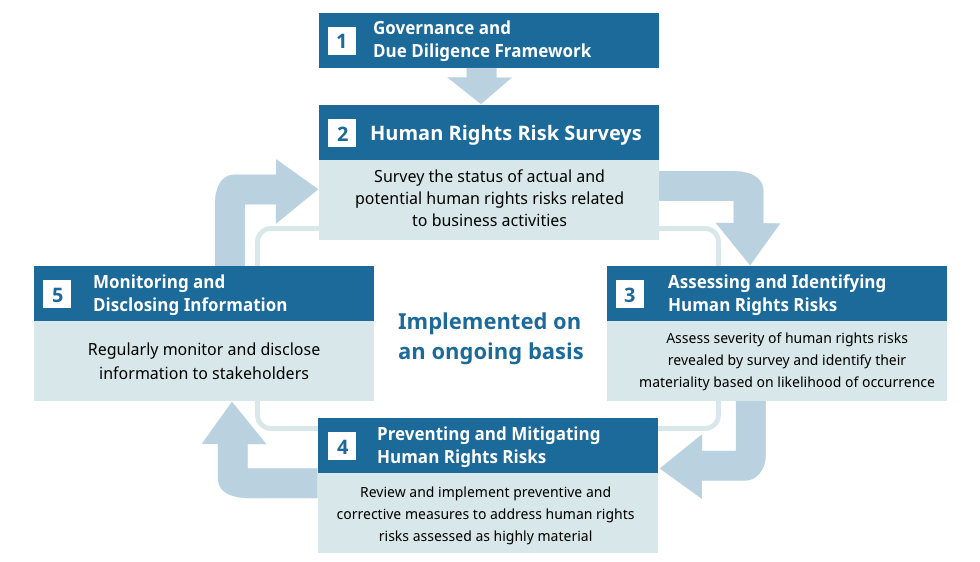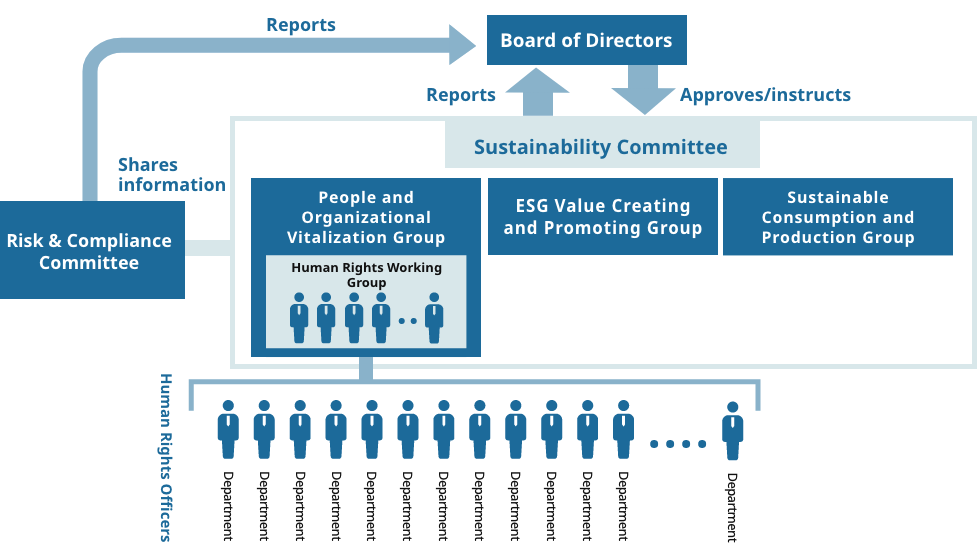- GlobalNetwork
-
- Global Site
- Americas
-
- United States
Respect for Human Rights
The Toyo Tanso Group established Toyo Tanso Group Human Rights Policy to help clarify the Group's stance and initiatives on human rights.
We understand the impact that corporate activities can have on human rights. As such, we remain dedicated to fulfilling our responsibility to respect the human rights of all stakeholders involved in Toyo Tanso Group's business activities.
Human Rights Policy
Toyo Tanso Group Human Rights Policy
Our fundamental philosophy of "Contribute to the world through the pursuit of the possibilities inherent in carbon (C)" is in itself a contribution to the advancement of a sustainable society. Under this philosophy we carry out numerous initiatives, which include supporting the SDGs through our products and business activities, aimed at resolving social issues.
Our initiatives are aimed at realizing a society that provides a safe and enriching lifestyle to people around the world. Indispensable to these initiatives is a respect for human rights.
With a sincere understanding of the impacts that the Toyo Tanso Group's business activities have on human rights, we make it our social mission to deal appropriately with these impacts. The Toyo Tanso Group Human Rights Policy was created as the ultimate guidelines towards fulfilling this mission.
Acting on this policy, we seek to work with our stakeholders to make society even more sustainable.
Scope of Application
The Toyo Tanso Group Human Rights Policy applies to all Group-wide officers and employees. We also ensure that the policy is thoroughly understood and adhered to by all business partners whose work is related to our products and services.
Adherence to Human Rights Laws and International Norms
The Toyo Tanso Group conducts its human rights initiatives based on the UN Guiding Principles on Business and Human Rights and in support of the UN Universal Declaration of Human Rights, the ILO (International Labour Organization) Declaration on Fundamental Principles and Rights at Work, and other guiding principles.
The Toyo Tanso Group also abides by human rights laws in the countries and regions where it does business. In countries and regions where local laws differ from internationally accepted norms on human rights, the Group follows the higher standard, and where they conflict, it does its utmost to abide by internationally accepted human rights.
Commitment to Human Rights Issues
-
1. Prohibit discrimination
We do not discriminate based on race, nationality, gender, sexual orientation, gender identity, age, disability, religion, ideology, or beliefs, or for any reason similar to these. -
2. Prohibit harassment
We do not harm anyone's dignity through actions such as abuse of power or sexual harassment. -
3. Prohibit child labor, forced labor, etc.
We do not accept the use of child labor, forced labor, or other unjust labor practices in relation to any business activities. -
4. Build and maintain amicable labor-management relations
We build and maintain amicable labor-management relations through respect for fundamental employee rights such as freedom of association and collective bargaining rights. -
5. Ensure workplace safety and health
With safety and health as top priorities in the workplace, we abide by laws in each country and region covering occupational safety and health to create an environment geared to preventing accidents and disaster.
Education and Awareness
In order for this human rights policy to be thoroughly understood and effectively carried out, the Toyo Tanso Group conducts education and training for all officers and employees, and promotes understanding of the policy among all business partners.
Human Rights Due Diligence
Based on the UN Guiding Principles on Business and Human Rights, the Toyo Tanso Group has built human rights due diligence mechanisms. Through these, we strive to spot negative impacts on individuals' rights, or risks of such, and then prevent or alleviate these.
Dialogue, Consultation
In implementing its human rights policy, the Toyo Tanso Group enlists the knowledge and advice of independent, outside experts in order to better conduct dialogue and consultation with stakeholders who have been negatively impacted in some way by the Group's business activities.
Correction, Redress
If the Toyo Tanso Group becomes aware that something in its business activities has caused or furthered infringement on someone's human rights, it will correct or redress the matter through proper methods and procedures.
Grievance Mechanisms
The Toyo Tanso Group strives to build and operate grievance mechanisms so that officers, employees, family members, and business partners with human rights infringement complaints can receive the necessary consultation and have their issues resolved.
Information Disclosure
The Toyo Tanso Group discloses information on its human rights policy through media such as its website and its integrated report.
This human rights policy has been authorized by the Board of Directors of the Toyo Tanso Group.
Representative Director
Chairman & President, CEO
Toyo Tanso Co., Ltd.
Human Rights Due Diligence
1. Human Rights Due Diligence at the Toyo Tanso Group
At the Toyo Tanso Group, we believe that respecting the human rights of all stakeholders involved in our corporate activities is deeply intertwined with our corporate growth. To ensure that our business activities respect these human rights, it is vital that we investigate all actual and potential human rights violation risks in our business activities, take measures based on the findings of these investigations to prevent human rights from being violated, and promptly and appropriately address any violations that do occur. In accordance with the Toyo Tanso Group Human Rights Policy, we are conducting human rights due diligence, beginning with business sites in Japan in 2024 and plan to gradually expand these efforts to the entire value chain, disclosing our findings accordingly.
(1) Human Rights Due Diligence Process

(2) Schedule
In 2024, the Toyo Tanso Group conducted human rights due diligence at Toyo Tanso Co., Ltd. sites in Japan. From 2025, the due diligence process will gradually expand as shown below.*The table below can be scrolled horizontally. Human Rights Due Diligence Implementation by YearToyo Tanso Co., Ltd. Toyo Tanso Group Major primary suppliers In Japan FY2024 FY2025 FY2025 Outside Japan FY2026, FY2027 FY2027
2. Governance and Due Diligence Framework
At Toyo Tanso, the human rights due diligence process is led by its Human Rights Working Group, established under the People and Organizational Vitalization Group, one of three groups within the Sustainability Committee, under the supervision of the Board of Directors. The Working Group labors in tandem with human rights officers appointed from each of the departments in the company to promote the process. Significant human rights risks are also shared with the Risk & Compliance Committee and incorporated into groupwide risk management.

3. Human Rights Risk Surveys
Toyo Tanso conducts human rights risk surveys to identify human rights risks within the Group. These surveys are formulated in reference to the UN Universal Declaration of Human Rights, the ILO Declaration on Fundamental Principles and Rights at Work, the UN Guiding Principles on Business and Human Rights, the Japanese Ministry of Justice Human Rights Bureau Areas of Human Rights to be Respected by Companies, and similar guidelines.
●Human Rights Risk Surveys Conducted in 2024
1. Scope of Coverage
All Toyo Tanso Co., Ltd. business sites in Japan2. Survey Method
- (1) Questionnaire to ascertain systemic conditions
- Toyo Tanso conducted a questionnaire survey of relevant departments to identify ways in which our human rights-related systems should be improved and to ascertain the status of activities designed to prevent human rights violations.
- (2) Questionnaire to ascertain situation for employees
- All employees were anonymously surveyed about the occurrence of human rights violations, workplace safety conditions, and similar issues.
- (3) Employee interviews
- Based on the responses to the questionnaire distributed in (2) above, a sample of employees from a sampling of departments were interviewed by outside experts to confirm the validity of the survey results and verify the possibility of human rights violations that could be inferred from the survey findings.
4. Assessing and Identifying Human Rights Risks
We assessed and identified risks for each human rights risk area based on the human rights risk survey. Risk is assessed in terms of two components: severity and probability. Severity is further assessed from three perspectives: degree of violation, scope, and reparability. Probability is further assessed from two perspectives: likelihood/potential and preventive measures. Our evaluation process includes outside experts to ensure that risks are objectively assessed and identified. The surveys we conducted identified the following human rights risks.
| Understanding/instilling human rights policy |
| Whistleblowing system |
| Treatment of non-fulltime employees |
| Harassment |
| Workplace safety |
| Climate change-related human rights |
5. Preventing and Mitigating Human Rights Risks
We will expand our efforts to prevent and mitigate identified human rights risks to include the entire Toyo Tanso Group, beginning with measures that can be immediately deployed.
(1) Understanding/instilling human rights policy
In order to help all employees understand the intention and content of our efforts to respect human rights and create a workplace free of human rights violations, it is essential that our human rights policy, which is the foundation of these efforts, is instilled as part of our corporate culture. For this reason, we regularly explain our human rights policy to employees and provide them with training to ensure that all employees know and understand the policy contents. We focus particularly on making plain our human rights policy to newly hired employees during their orientation training.(2) Understanding/instilling whistleblowing system
Some employees may not understand how to use the whistleblowing system or fear negative repercussions if they utilize the system. We therefore strive to dispel concerns by providing employees with a proper understanding of how the whistleblowing system works and how to use it, so that our employees are able to consult with hotline staff without concern.(3) Treatment of non-fulltime employees
Although we have not faced any systemic issues related to wages or other aspects of the actual treatment of non-fulltime employees, we continually review how these employees are treated in practice to ensure the tenet of equal pay for equal work, including the balance between work content and wages. If any issues are identified, we work to improve the situation.(4) Preventing harassment
Training on various types of harassment and discrimination has been, and will continue to be, provided to all employees. As an area for improvement in the future, we have found that there are cases where it is difficult for employees to distinguish between what is and what is not deemed harassment in the context of power or sexual harassment. We are therefore focused on improving our training program to include specific examples of harassment to clarify this matter for employees.(5) Ensuring safety in the workplace
In our factories, warehouses, and transportation-related workplaces, we continually work to identify dangers and conduct improvement and hazard avoidance activities. Information on hazards and improvements related to specific departments are shared widely within the Group to alert other departments and help them in implementing safety measures.(6) Responding to climate change and instilling awareness within the Group
We continue to conduct in-house training on climate change responses to ensure that awareness of this issue is deeply instilled within the Group. We are also working on formulating more detailed plans for initiatives to reduce GHG emissions so that employees are able to consider and work on these initiatives by incorporating them into their own tasks.
6. Monitoring and Disclosing Information
We conduct annual employee satisfaction surveys to ascertain the opinions of our employees and their situations in the workplace. Our Human Rights Working Group monitors progress on actions to address human rights risks through correction and prevention and reports its findings to the Sustainability Committee. In addition, we plan to conduct human rights risk status surveys approximately every three years on each survey area, monitoring the effectiveness of preventive and corrective measures taken to address human rights risks.
The content of these reports will be disclosed externally on our website or in our Integrated Report.

